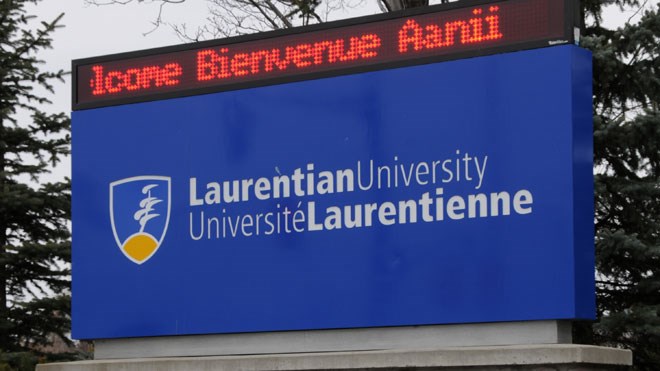Laurentian University needs improvement when it comes to offering workplace co-ops and other experiential learning to its humanities, social sciences and management students, a committee commissioned by the university has learned.
It is doing well with offering this type of education to students in its science, engineering and professional programs, however.
Between 15 and 18 per cent of the course content offered to humanities, social sciences and management students include some type of hands-on learning.
That's in contrast to 38 per cent of the course content offered to professional students and 43 per cent to science and engineering students.
Overall, roughly 24 per cent of course offerings at Laurentian involve workplace co-ops or experiential learning, which could also include on-campus activities such as laboratories or group work.
However, David Lesbarres, a member of the committee studying the issue, director of graduate studies in Laurentian's biology faculty, said the university would like to boost that number to 50 per cent.
“Learning is not just in the classroom anymore,” he said, speaking to Northern Life after his committee presented their report at Laurentian's Feb. 14 board of governors meeting. “It's not just a blackboard or a computer.”
One of the stated objectives of the university's 2012-2017 strategic plan is to bring in “integrated classroom learning with real-world experience, through placements, case-based projects, independent learning, applied research, studies abroad, group work, community service or senior capstone projects, with alumni support.”
Lesbarres said while workplace co-ops and experiential learning are more common in science, engineering and professional programs, that doesn't mean they can't be introduced more in other types of programs.
“We had students from women's studies who came and said there's so many shelters and associations that work with women in Sudbury,” and they'd like to work there as part of their program, he said.
Similarly, perhaps English students, instead of studying a book, could do some creative writing, or stage a dramatic reading of the work, Lesbarres said.
“It's more interactive,” he said.
So what can the university do about this?
The committee studying the issue has suggested that the university reach out to the community more to create more co-op opportunities. To aid in reaching this goal, the committee has suggested staff members be hired to work on the issue.
It also suggested more resources be allocated to incorporate workplace co-op and experiential learning into the curriculum, especially in areas where they're lacking.
“Examples are history, commerce and women's studies programs, to name but a few,” the report said.
However, the committee also said it's of the opinion that the existence of hands-on learning at Laurentian is “very much underestimated,” and more needs to be done to publicly promote it.
@heidi_ulrichsen
Join Sudbury.com+
- Messages
- Post a Listing
- Your Listings
- Your Profile
- Your Subscriptions
- Your Likes
- Your Business
- Support Local News
- Payment History
Sudbury.com+ members
Already a +member?
Not a +member?
Sign up for a Sudbury.com+ account for instant access to upcoming contests, local offers, auctions and so much more.
